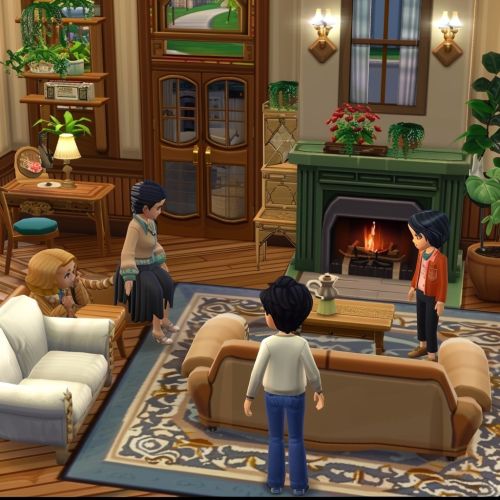Social Simulation Game
Introduction
A social simulation game is a genre of video games that simulates the social interactions and relationships between virtual characters. These games often emphasize the development of social networks, the management of interpersonal relationships, and the simulation of social environments. Social simulation games can vary widely in their mechanics and themes, but they typically involve creating and managing virtual characters, known as avatars, within a virtual world.
History
The origins of social simulation games can be traced back to early computer games that attempted to simulate real-life activities and interactions. One of the earliest examples is Little Computer People (1985), which allowed players to observe and interact with a virtual character living inside a house. However, it was not until the release of The Sims in 2000 that the genre gained widespread popularity. Developed by Maxis and published by Electronic Arts, The Sims allowed players to create and control a household of virtual people, managing their daily lives, relationships, and careers.
Gameplay Mechanics
Social simulation games typically involve a range of gameplay mechanics designed to simulate social interactions and relationships. These mechanics can include:
Character Creation
Players often begin by creating one or more avatars, customizing their appearance, personality traits, and other attributes. This process can be highly detailed, allowing for a wide range of customization options.
Social Interactions
A core component of social simulation games is the ability to interact with other characters. These interactions can take many forms, including conversations, gestures, and shared activities. The outcomes of these interactions can influence the relationships between characters, affecting their emotions and behaviors.
Relationship Management
Players must manage the relationships between their avatars and other characters. This can involve building friendships, romantic relationships, and even rivalries. The dynamics of these relationships can be influenced by various factors, such as compatibility, shared interests, and past interactions.
Environmental Simulation
Many social simulation games include detailed virtual environments that players can explore and interact with. These environments can range from small households to entire towns or cities. Players can often customize and decorate these environments, adding a layer of personalization to the game.
Life Simulation
In addition to social interactions, social simulation games often simulate other aspects of daily life, such as work, education, and leisure activities. Players must balance these activities to ensure the well-being and happiness of their avatars.


Notable Examples
Several social simulation games have become iconic within the genre, each offering unique gameplay experiences:
The Sims Series
The Sims series, developed by Maxis, is one of the most well-known and successful social simulation game franchises. The series has seen numerous expansions and sequels, each adding new features and gameplay mechanics. Players create and control a household of virtual people, managing their daily lives, relationships, and careers.
Animal Crossing Series
Developed by Nintendo, the Animal Crossing series is another popular example of a social simulation game. Players move to a new village inhabited by anthropomorphic animals and engage in various activities such as fishing, bug catching, and fossil hunting. The game emphasizes building relationships with the villagers and customizing the player's home and surroundings.
Stardew Valley
Stardew Valley is a farming simulation game with strong social simulation elements. Players inherit a rundown farm and work to restore it while building relationships with the residents of the nearby town. The game includes various social activities, such as festivals, gift-giving, and marriage.
Impact and Cultural Significance
Social simulation games have had a significant impact on both the gaming industry and popular culture. They have been praised for their ability to simulate complex social dynamics and provide players with a sandbox environment to explore and experiment with different social scenarios. The genre has also been noted for its inclusivity, allowing players to create and represent diverse characters and relationships.
Research and Academic Interest
The study of social simulation games has become an area of interest for researchers in fields such as psychology, sociology, and game studies. These games provide a unique opportunity to observe and analyze virtual social interactions and behaviors. Researchers have used social simulation games to study topics such as social networks, group dynamics, and the effects of virtual environments on real-life social skills.
Future Developments
The future of social simulation games is likely to be shaped by advancements in technology and changes in player preferences. Emerging technologies such as virtual reality (VR) and artificial intelligence (AI) have the potential to enhance the realism and complexity of social simulations. Additionally, there is a growing interest in incorporating more diverse and inclusive representations of characters and relationships within these games.
